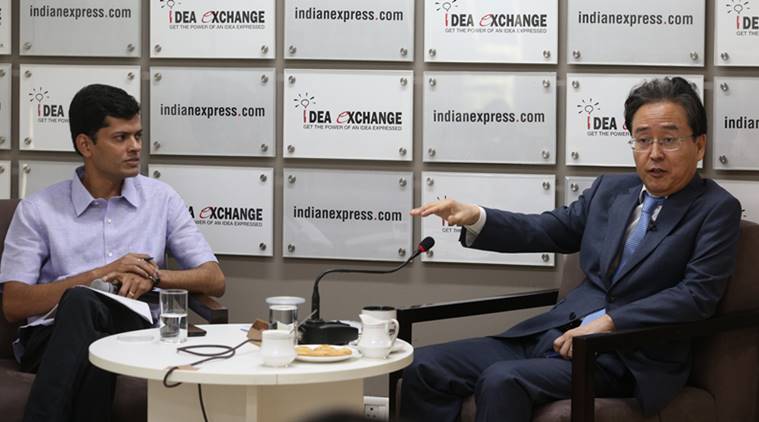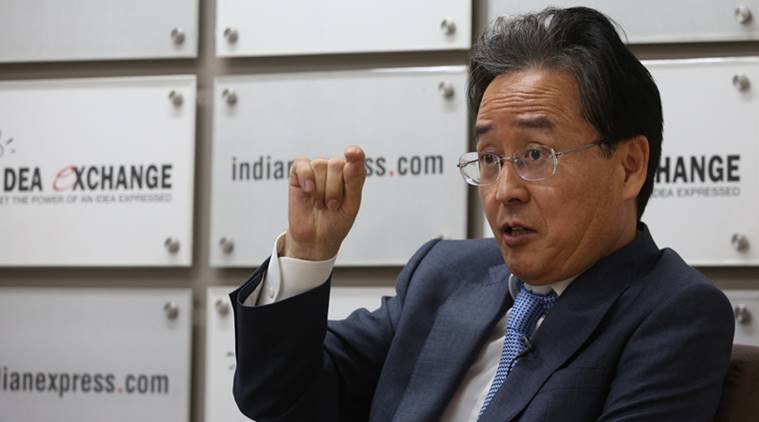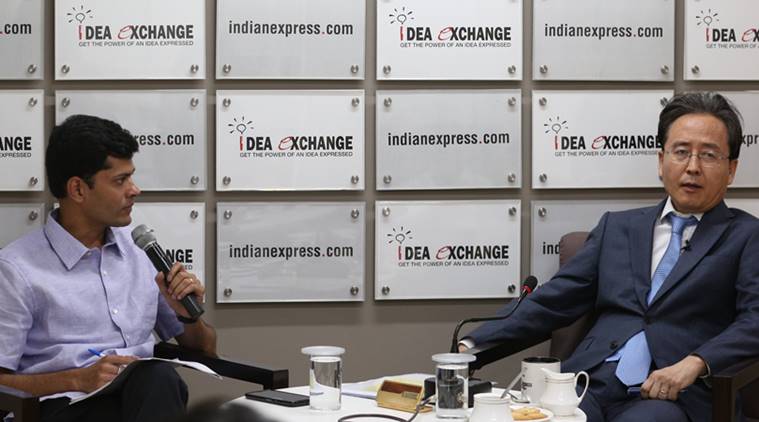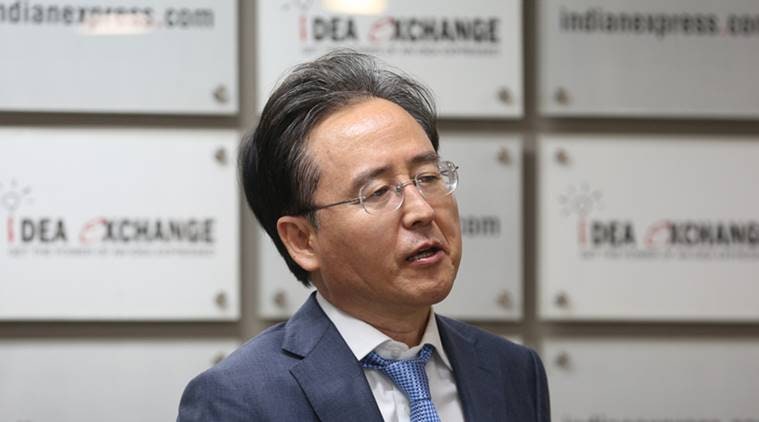South Korea Ambassador to India Shin Bongkil says he is “cautiously optimistic” about North Korea’s denuclearisation promise, hopes for gradual integration of the two Korean nations, believes PM Modi’s pledge to make India a $5 trillion economy is not just propaganda, and calls for a new economic partnership with India

Ambassador Shin Bongkil with Senior Editor Shubhajit Roy in The Indian Express newsroom. (Express Photo by Amit Mehra)
On June 12, American President Donald Trump and North Korean Leader Kim Jong-un met in Singapore, in the first summit-level meeting between the leaders of the two nations. While North Korea agreed to complete denuclearisation, Trump returned the favour by stalling all military exercises with South Korea. A career diplomat and an expert on North Korea, South Korean Ambassador Shin Bongkil is optimistic about the developments in the Korean Peninsula. He has also served as a diplomat in China (twice for a total duration of seven years), a country which is playing a pivotal role in shaping North Korea’s relationship with the world
SHUBHAJIT ROY: The meeting between US President Donald Trump and North Korean Leader Kim Jong-un was historic. Why do you think North Korea has come to the negotiating table now?
There are a couple of different elements here, one of which is the sincere and genuine effort of South Korean President Moon Jae-in. North Korea knows President Moon’s background and beliefs. So they believed in the sincerity of my President and the new government in Seoul. The second element is that this time the North Korean Leader realized that his country cannot go on in this manner. With such severe sanctions from around the world, particularly with the participation of China, they realized that it was not possible to escape. Also the young Leader, who has experienced the outside world — he spent a couple of years in Switzerland — personally believes that North Korea cannot survive as it is. They need economic development, and that they need to bring prosperity to their own people. The third element is that North Korea has achieved a certain level of nuclear deterrence. Until now, they didn’t have such a deterrence and did not want to come to the table. This time, however, they themselves declared that they have achieved nuclear capability and so they have certain leverage in the game. I’m cautiously optimistic. This time they directly wanted to talk to the US. After the Singapore Summit meeting, in front of the entire world media, they promised denuclearisation.
SHUBHAJIT ROY: The statement released after the Summit talks of complete denuclearisation of the Korean Peninsula. However, experts point to lack of phrases such as ‘verifiable’ and ‘irreversible denuclearisation’ in the statement. How do you counter such suspicion regarding North Korea’s intent?
I think the more important thing is trust between the parties. I personally believe that commitment is crucial here. North Korea in talks with President Moon as well as President Trump agreed to complete denuclearisation.
SHUBHAJIT ROY: Post the meeting, President Trump said that he would stop the war games. How do you see that playing out with respect to the South Korean foreign policy?
Yes, the South Korea-US annual military exercise has been suspended. But I think if there is no threat, there is no need for that kind of military exercise. To have an environment for serious negotiation in the future the two sides are showing some kind of sincerity. I think many South Koreans accept that. This type of exercise can be reconvened if either party breaches its promise.
SHUBHAJIT ROY: What do you think of China’s role in this entire exercise? The North Korean Leader recently visited Beijing.
China has an important role to play in ensuring permanent peace in the Korean peninsula and Northeast Asia. Historically, China has been an important player in issues relating to the Korean Peninsula. Even though it established diplomatic relations with North Korea, their bilateral relations were not so good, particularly following the Chinese sanctions. North Koreans were angry with China’s approach. But North Korea needs China. In the negotiations, North Korea needs a guardian. China can play a guardian’s role. I’m more positive of China’s role in this process.
RAKESH SINHA: Will the Summit signal a shift in the power balance in East Asia?
No, I don’t think so. The major stakeholders in Northeast Asia believe in the denuclearisation of the Korean peninsula. For the past two decades South Korea has had very good diplomatic relations with China, and the US and Japan are our allies. North Korea can have a formal relationship with the US and Japan, South Korea’s new government does not oppose it. We are ready to co-exist with North Korea. Earlier, our relationship with the North Korean regime had collapsed. We had a very hard stance towards each other. But if everything goes well, I think the relations will be normal again.
RAVISH TIWARI: Previous commitments by North Korea have failed to improve the situation. Why should the world be optimistic this time?
This time there is political will on all sides — the US, South Korea and North Korea. Previously there were agreements as well, but I don’t believe there was real commitment. But this time, President Moon, President Trump and Kim Jong-un are very serious.
RAVISH TIWARI: The wall between West and East Germany crumbled. What is it that separates North and South Korea today?
When the Berlin Wall crumbled, there was already a long history of exchanges between the two sides. The people on both sides knew each other. The Korean situation is different. There has been a divide for over half-a-century. There were no exchanges between the people. North Korea was a very closed society until now.
We hope for gradual integration between the two sides. Peace is first, unification is next. We have witnessed some changes in North Korea. The market is influencing the situation a lot. We view this change positively. We would like to help them move towards more marketisation. Not regime collapse, but the character of the regime should be different — more democratic in nature. This can lead to political integration in the future. That is South Korea’s present strategy.

“The two countries have agreed that at future sports events the North and the South will play under one flag”, said the South Korea Ambassador. (Express Photo By Amit Mehra)
ANIL SASI: Both North and South Korea have removed loudspeakers used to broadcast competing propaganda messages across their shared border. Is there any significance of the move beyond symbolism?
I think it is important. North Korea is a very closed society, they do not know much about the real South Korea, and they were hearing these (propaganda) messages. Also, the North Korean leadership was very sensitive about it and they continuously asked to stop it, and so we did it. We hope it can be a conciliatory move and improve relations between the countries.
MIHIR VASAVDA: How do you see the relationship between the two countries on a more personal, people-to-people level?
The North Korean regime made a political statement that Korea is one and should be unified. They blame US imperialism for the division. And yes, most people in the North want unification. The situation in the South, however, is a little different. If we ask the younger people, those in their 20s or 30s, they are okay without unification. Why? They believe that the North is creating problems and that even though we support them economically, they don’t feel any gratitude towards us. (The younger generation feels that North Korea) develops weapons of mass destruction and continuously threatens the South. So there has been this aspect to the public opinion in the South. These days, however, it is changing and the Summit meetings have contributed positively to the change.
MIHIR VASAVDA: At the Winter Olympics we saw both Koreas march under one flag and it is likely to happen at the Asian Games as well. Is there a larger context to it? Will the entire contingent play together under one flag?
Yes, the two countries have agreed that at future sports events the North and the South will play under one flag, and will also cheer the other team. There have been military-level meetings, other high-level meetings between the two countries… So, this will go on as well. The North Korean Leader has already declared on television and radio that the two nations are reconciling. The Summit meeting between Kim Jong-un and Trump was broadcast on North Korean television. It’s quiet a big change.

“Donald Trump and Kim Jong-un don’t want to lose momentum. We should not lose this momentum and if we hasten this process, it has merit.” (Express Photo By Amit Mehra)
SHUBHAJIT ROY: What do you make of India’s role in the region? India went along with the sanctions against North Korea and was seen as more favourable towards the South. A month ago, the MoS, External Affairs, visited North Korea, after a gap of almost 20 years.
I look at the developments positively. I think that India, despite being under some kind of pressure from Western countries, maintained its diplomatic mission in Pyongyang. It gave India a kind of leverage to influence North Korea. It was a good thing, we don’t oppose it. India, as a leading global power, has great influence in world politics, it has a voice in the Korean Peninsula issue… India is playing a really constructive role. As far as I know, when North Korea was suffering from famine, India provided food. So it has leverage and some engagement in issues of the Korean Peninsula. It will be helpful in the future.
ABANTIKA GHOSH: Like India is doing with yoga, do you plan to push K-Pop to project your soft power to the world?
Recently, I saw two very interesting photographs in the newspaper. One picture showed people in Paris practising yoga. In another picture I saw people in Seoul practising yoga in the city’s central downtown. So Koreans also have interest in yoga. For a long time, Koreans have been curious about India because in ancient times, almost 2,000 years ago, a Korean king married a princess from Ayodhya. It is mentioned in Korean history books. Some say it’s a myth, others think of it as a fact. Now scholars are trying to find the truth.
I visited Ayodhya and also met Chief Minister Yogi Adityanath. He was enthusiastic about building a Queen Huh Memorial Park. We have been given a big plot inside Ayodhya city to build the park. In the future, we will invite Korean tourists there.
SHUBHAJIT ROY: When Prime Minister Modi went to Seoul in 2015, the relationship was upgraded to ‘special strategic partnership’. What have been the major developments since then?

“The major stakeholders in Northeast Asia believe in the denuclearisation of the Korean peninsula, said the South Korea Ambassador. (Express Photo By Amit Mehra)
Terms such as ‘special strategic partnership’ are not important. The important thing is that this new administration, compared to previous administrations, emphasises on having a relationship with India. In the past couple of decades, we have been very heavily dependent on our relationship with China, the United States, Japan and Russia — four major powers. For example, our annual trade volume with China is almost USD 250 billion. It is a big amount. We are dependent on China for investments. But China has become quite competitive now, it is a big economic power, and we no more have the kind of relationship that we had earlier (in terms of trade). So we need a new economic partnership and India is growing — economically and politically. There is almost 7 per cent growth rate. India has more potential and the growth rate will jump to double-digits soon. Twenty years ago, China’s growth rate was 12-13 per cent, and India has the potential to reach that kind of growth rate, particularly under the leadership of Prime Minister Modi. He is all about development and the diplomatic community sees it very positively.
I hear that PM Modi’s government has pledged that in the near future they will take the economy’s size to USD 5 trillion. That will make India one of the top three economies in the world. I think it’s not just propaganda, it’s possible. Everyone looks at India as a big potential market, an investment destination — you can make products here and export it to other countries. I recently visited Hyundai Motors in Chennai. It is modern and very impressive, better than I thought. Hyundai is competing very strongly with other top car makers. I hear they are the top exporters, much bigger than Maruti Suzuki, Toyota etc. Also, Samsung is expanding its factory here. They are soon going to establish a second factory. Previously, Samsung had its biggest factory in Vietnam but soon the Noida factory will be the largest in the world, smartphone-wise. Samsung also has a big R&D office in Bengaluru. Less than 20 Koreans work there. The rest are Indians, even the top two — the CEO and his deputy. I was surprised. Why say it is a South Korean company? It is an Indian company.
Korean companies are showing a lot of interest in the Indian market and Indian conglomerates are also showing interest in business relationships with Korea, particularly Anil Ambani’s Reliance. Under ‘Make in India’, they will undertake joint ventures and build companies here. Reliance already has an office in Seoul. They are interested in areas such as defence, solar energy, engineering and also finance. So the economic relations are expected to expand in the future.
RAVISH TIWARI: You have spent a lot of time in Beijing. What do you make of China’s global ambitions and does it worry South Korea?
I have stayed in Beijing for almost seven years as a diplomat and I have many friends there. They have a kind of communist system, sometimes authoritarian… They are hardworking people with discipline. All of these have helped drive China’s success story. But there is also a complaint in the society about the big gap between the rich and poor. So there is also a negative side to the rapid economic development.
I think China and India are two countries that should get along well. You are the biggest, most influential, growing powers in the world. It is important that you get along well with China. China can never disregard you. You are such a big power, with big population and democracy. Now everybody respects India.
SHUBHAJIT ROY: Would South Korea like to join the India-US-Japan-Australia Indo-Pacific Quadrilateral in the future?
I think yes… Every country has the right to align themselves with other countries. As far as I know, the relationship of these four countries is not military oriented or aimed at opposing other parties. The Indo-Pacific region is an important area. It should be peaceful. It (the Quadrilateral) reflects the growing power of India in world politics.
AMITAVA CHAKRABORTY: The Singapore Summit is over and the leaders are back home. History has taught us that haste makes waste. How do you see things moving forward in North Korea now?
I think sometimes haste leads to meaningful results as well. Donald Trump and Kim Jong-un don’t want to lose momentum. We should not lose this momentum and if we hasten this process, it has merit. My President will visit North Korea in the coming fall.
Of course there will be problems, but the vision of top leaders can bring about a change. We need a political winner. I don’t think this is too hasty. My President is a very patient man. He shares that quality with PM Modi. He has a firm belief in development and is also a visionary. He has the vision to bring peace and stability in the region. Modi is very bold and my President is very bold. They are also very clean politicians.
Muskan Sethi: How important do you think is people-to-people contact, including student exchanges, cultural programmes etc for India and South Korea relations?
I think exchanges between top leaders actually help to promote people-to-people contact. When my President visited India, it was extensively covered by the Korean media and this time, I hear, that more than 200 media people from Korea will accompany him. I think it will be an extensive coverage… Many Koreans have already showed interest in India…We are talking of visa-on-arrival to facilitate tourists.
India has done a lot of positive things like Indian high school textbooks for first time introduced Korean history… Formally there was only China and Japan in East Asia. Now they have introduced Korea. This is an important development… and also, Indira Gandhi National Open University is starting Korean language course from this July.
Avishek G Dastidar: Since we were talking about soft power and people-to-people contact, sports plays an important role in these areas. The football World Cup is underway. How do you view chances of the Korean team winning the football World Cup this time? What is the reason that since 2002 the team hasn’t done very well in the competition?
People’s interests are continuously moving. In 2002, it was sports. When certain countries develop, then people’s interest also diversifies. At that time, more Koreans were focused on soccer…, but now it has changed… Maybe we move on to cricket. We have a cricket national team and I tried to invite it to Delhi and have a competition with your junior team. I pushed it to the Lieutenant Governor and he said that we will invite the team… and have a competition with a team comprising of players selected from the underprivileged section. Sachin (Tendulkar) is a famous cricketer and he could be invited to coach the home team. And they may play in New Delhi’s stadium. Then I asked LG if people will come to see it? They said people will come and we are confident. They may not come to see the Korean national team but they may want to see Sachin. We will have a meagre entrance fee and the money collected will be donated for the underprivileged. I spoke to the Indian foreign ministry to organize it when my President visits India, and Prime Minister Modi and President Moon could attend the match together. Wouldn’t it be a nice picture? But the foreign ministry said it’s a very interesting and nice idea, but too risky… they were not so passionate about it. So I gave it up. We can still bring the Korean national cricket team here. Maybe to compete with high school teams.
[Disclaimer]









